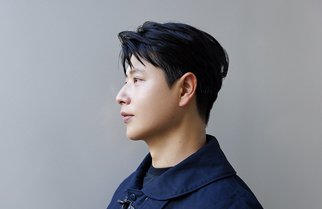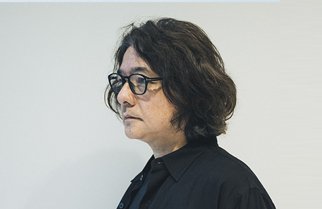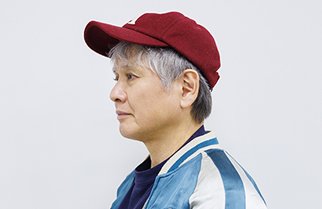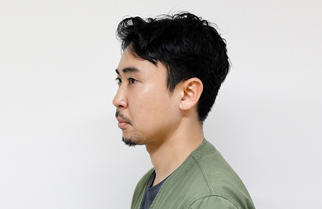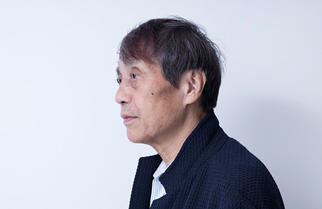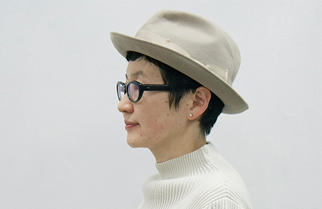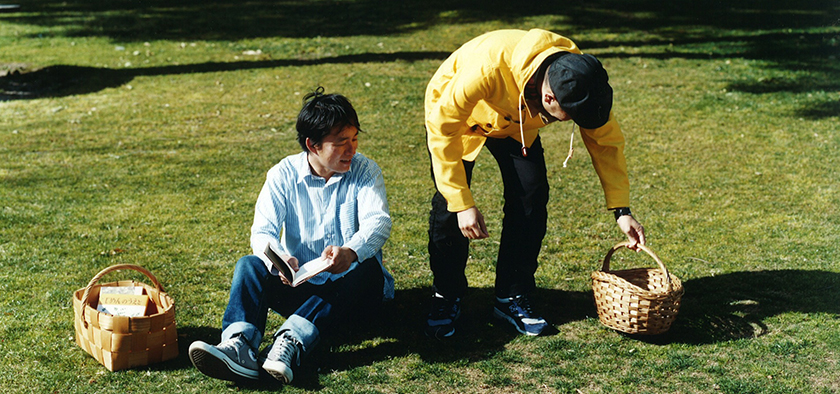
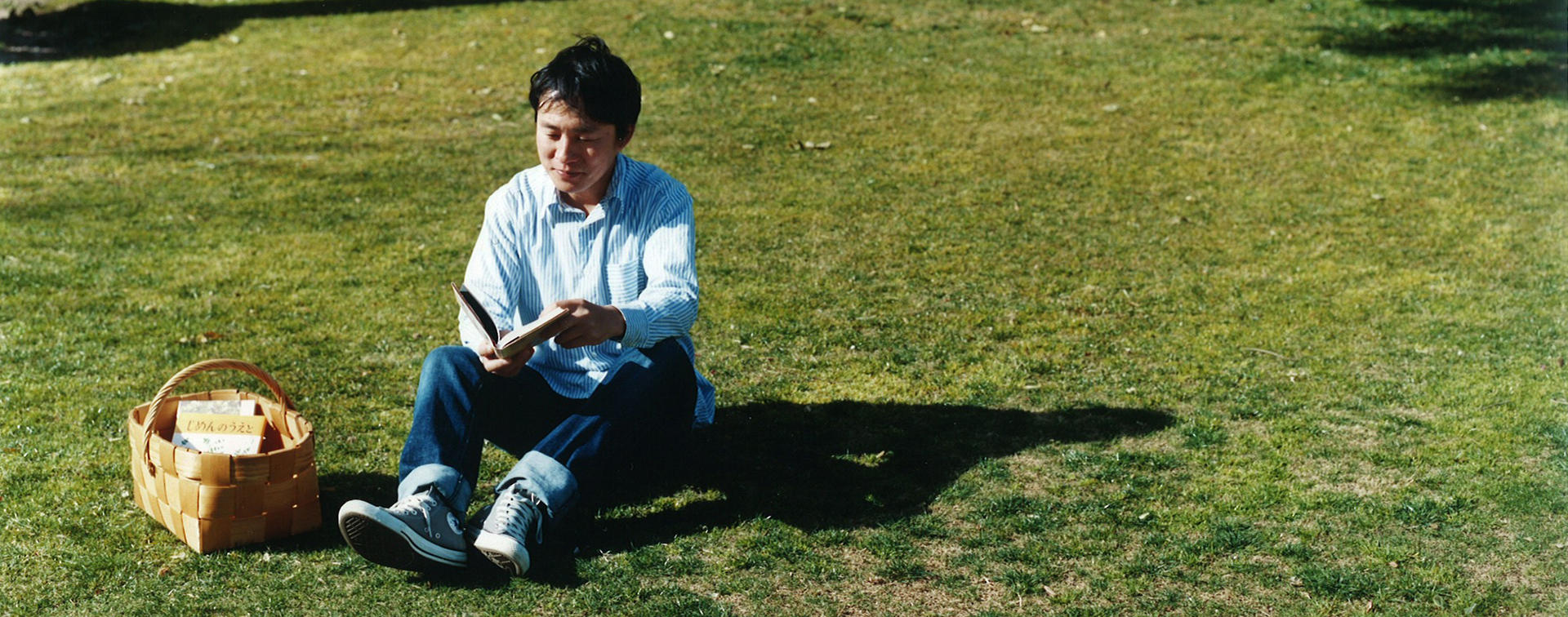
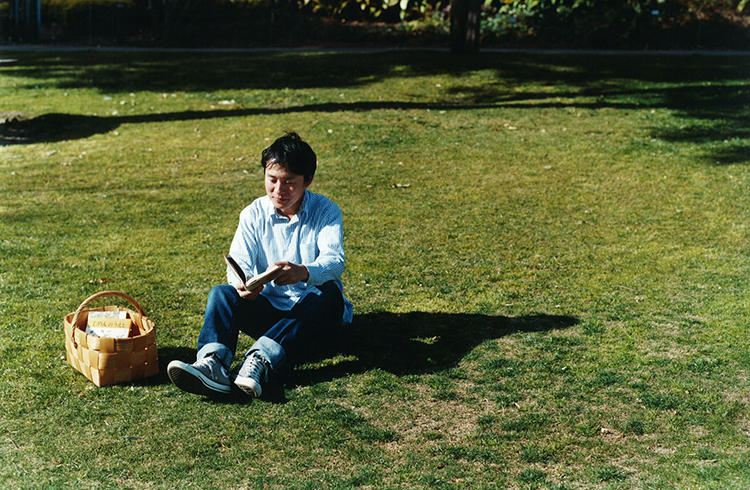
How would you turn Roppongi into an area of Design & Art?
Find interesting things about Roppongi and transmit information ーEguchi Hold a reading festival to introduce new ways of reading books ーHaba
Book curator Yoshitaka Haba and Hiroshi Eguchi, owner of the bookshop "Utrecht" are sitting on the Grass Square at Tokyo Midtown and reading. Haba also edits and writes books, and Eguchi does direction work for art book fairs. Since both are involved with books in various ways, it was natural for them to make proposals for utilizing books. Haba and Eguchi, who have known each other for a long time, meet in Roppongi every week to record radio programs. Their conversation proceeded at a brisk pace, and Eguchi took on the role of emcee for the interview.
Park Library and the "Momomo" Exhibition
Hiroshi EguchiYou have all kinds of ties to Roppongi, don't you, Haba-san?
Yoshitaka Haba Yes, I am one of the so-called Roppongi people. (laughs) I used to work at the Aoyama Book Center in Roppongi. And for five years after it opened, I was in charge of the direction for "TSUTAYA TOKYO ROPPONGI". And for the last three years I've been doing the J-WAVE radio program broadcast from the Roppongi Hills Keyakizaka Studio; in the "Page by Page" section, Eguchi-san and I take daily turns to introduce books. Ever since the Tokyo Midtown opened, I've been curating books for "d-labo". Last year, we did a book-reading event on the Grass Square in Tokyo Midtown called "Park Library" during Golden Week. We'll be holding the event again this year!
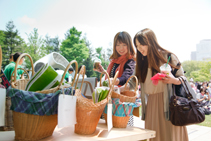
Park Library
An outdoor event where people can spend a pleasant time reading on the lawn. Books are selected based on keywords chosen by Haba. Visitors can borrow a basket containing three books and an outdoor mat for free.
For information on the Park Library 2013, please check the following site.

d-labo
A space with the theme of "collecting, showing and growing dreams" where many kinds of the latest technology can be experienced. Visitors can freely read books which Haba has chosen. Seminars are regularly held. Please check the following site.
EguchiI will be doing the direction for all the words used at the "Momomo" exhibition, which will be held from April 12 at the Tokyo Midtown Design Hub.
HabaWhat does "momomo" mean?
Eguchi"Aremo, koremo, soremo" (this and that and that over there)
HabaIt seems to greedily cover a lot of things.
EguchiWell, perhaps it does. It's an exhibition of already existing things that have been chosen by ten people on the basis that they can be regarded as design. I am one of the people who chose the items; Hashizume So-san did the art direction. The exhibition aims to show to young people like junior and senior high school students that designs are interesting and fun. The intention is to give them an opportunity to look at things from a new perspective and to make discoveries.
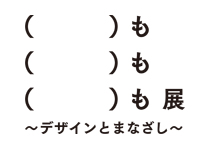
( ) mo ( ) mo ( ) mo -Design and ways of seeing-
An exhibition of items that are often found in the home or school, and which are young people will familiar with. Ten people, including Hiroshi Eguchi, have chosen both tangible and intangible things which could potentially be called works of "design."
Place: Design Hub
Period: April 12- May 12
http://www.designhub.jp/exhibition/2013/03/14-1500.html
Today's theme for the talks is about ideas to turn Roppongi into an area of design and art. Why, in the first place, do we want to turn it into an area of design and art?
HabaWhy...Putting aside the question of why for the moment, I think it's true to say that the meaning of the word "design" has changed considerably. So if we are going to talk on this theme, we should expand the boundaries and talk about aspects of designs that have not been discussed before. I think that from now on, people are going to talk more about designs in all kinds of ways and not just when talking about a chair that someone made, or a product put on the market by some company. Meanwhile, the word "design" seems to be used too frequently. It's no good just using "design" for everything. We should decide on ways to steadily incorporate the methods of design.
EguchiThe "Momomo" exhibition makes us think about the role of design. Designs play an important part in recent movements to revitalize localities. For the last two years, I've been involved in a project to revive the local industries in Yamanashi Prefecture. Things don't go well when we just think about making our own unique brand, so we focus our energies on analyzing what we already have; we take a good look at them and then we think about how we can present them.
It often turns out that the more we try to make the packaging better, the more difficult it becomes to differentiate ourselves from other brands. And when we try to boost sales, there are other areas where sales become weak. So I think the first thing we need to do is to realize that this sort of lopsidedness or imbalance exists.
Roppongi itself is quite an imbalanced town, isn't it? There are places like Tokyo Midtown and Roppongi Hills on the one hand, while on the other, there are alleys around the Roppongi crossing where a lot of activities take place to lure customers. But that's what makes this town interesting. So in thinking about Roppongi and design, I feel that we should not go out of our way to create something new; I think it's better if we first began talking about the town's interesting points.
A "reading festival" in Roppongi
HabaThings probably won't go well if you make it your objective to turn Roppongi into an area of art and design. I think the good thing about the town is that it has many different kinds of activities taking place. In that sense, my personal wish would be to hold a "reading festival" in Roppongi. A reading festival is an outdoor event which introduces people to a new way of reading books. In November last year, Eguchi-san and a group of people and I held the first reading festival at the Suijyo Ongakudo in Ueno-onshi-koen Park. Using a microphone, ten writers recited in front of an audience of about 500 people.
EguchiPeople usually read books at home, alone and quietly. But the very opposite of that is to read outdoors, with other people and loudly. Haba-san and I were standing around and talking about how that would be like a festival, and that's how the event got started. And when we held the event, it was really good. At a reading club, one person reads to about five to ten people, but when one person is reading to 500 people, it becomes like a festival. It's just reading aloud, but people are using their imagination with the same story; if the story is about a having a meal at a table, there are 500 versions of the dining table in the minds of 500 people. So when the reading is over, there's a great sense of excitement. It's nice that a reading festival makes possible that kind of phenomenon.
HabaWhen a person reads aloud from his own book, you can get a direct understanding of what he was thinking when he wrote it by listening to the tone of his voice and the places where he takes his breath. Reading aloud is a primitive form of reading, where a story is carried by a person's voice to the ears.
A powerful energy is born with the physical gathering of a lot of people. Because we live in a society where we can communicate with the smart phone, I think the physical senses are more important than ever: there is a strong sense of being in the physical body and in tangible things - there is an irreplaceable appeal. So we need to get together even if it feels bothersome. We should come closer with other people. It's important to take the time and effort to come to a venue. The realization has recently come to me that unless people come together, interesting things just don't happen.

Taking books to "relentless places"
HabaWhat I would like to do now is to take books out into the streets. These days, I get the feeling that the book industry needs to go out into "relentless places."
People who like books are really fond of books. In Japan, people don't mind waiting for an hour at events to have their books signed by the author or to shake hands with the author. And if there is something in the book that they can't understand, they blame themselves for not being clever enough. They feel defeated if they don't read from the very first character to the very last character of the book. If we presume that there is a "reading hierarchy" in Japan, the writers are at the top. Below them are the editors, and at the very bottom are probably the readers. When books are kept in that kind of situation for a long time, book lovers will keep on looking up to writers, calling them "sensei", but other people will ask questions like, "How do novelists make a living?" or "If we read fiction, would it benefit the management of our company?" I want to do something to narrow this huge gap.
At the Tokyo International Literary Festival in March this year, we held a recital event using the public address system at the Shinjuku Isetan department store. Over a series of eight sessions per day, four writers including Shuntaro Tanigawa-san, recited their poems and short stories. Of course, there were people who were listening properly, but there were also people who weren't listening at all - who didn't even hear. On the last day of the event we did a "recital live" which was very well received. There were female customers passing by with an expression of "Who is that? This is interesting." Taking books to such "relentless places" leads to new things that never happened before. I realized then that it's very important to try to influence people who have absolutely no interest in books.
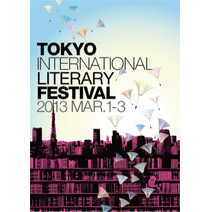
Tokyo International Literary Festival
A three-day event held from March 1 2013, gathering writers from Japan and abroad. Talk shows, recital events and workshops were held in various places in Tokyo.
And it seems to me that Roppongi is a "relentless place" for books.
EguchiThere really are people who just have no interest in books.
HabaIt would be awesome if writers could make people understand their works by their performance alone in a place packed with all kinds of extreme people. I think that in a way, Roppongi is a really fair place for books. Just imagine for example, a group of writers reading aloud at the Roppongi crossing. Almost everyone would probably think, "What on earth is that?", but books should really have the strength to attract people's attention in that kind of place as well, don't you think?
EguchiYes, I do.
HabaAt the Park Library event held on the Grass Square, people who don't like books come to borrow the baskets because they want to borrow the outdoor mat that comes with the books. They use the books as weights to fix the mat in place and then they go to buy beer.
EguchiBut they do read a little bit, don't they?
HabaThat's right. That's the great thing about the Grass Square. The lawn feels soft and nice, and in May, there's the early summer breeze blowing. A guy sitting there thinks, "My wife is doing shopping. Ah, I have nothing to do." And so he eventually takes a peek at the books that were originally being used as weights.
Nowadays, many people buy books online and buy only the books they know about. If you want people to pick up books they have no knowledge on, I think it's important to create a comfortable environment for the body and mind. That's why there's such significance in reading a book on the Grass Square in Tokyo Midtown. One middle-aged guy once told me that he had read a book for the first time in two years. For me, being involved in books, that was a shocking comment. But at the same time, I was pleased that I'd helped create an opportunity for this person to read a book for the first time in two years. I'm acutely aware of the fact that book lovers are limited to a really small group of people, and that's why I am motivated to do new work.
The same thing can be said about design and art. People working in design and art are not aware that they are doing very specialized things and they present works on the premise that people would naturally understand. But in reality, I think there are many cases where communication is not taking place at all.
Looking at things from multiple perspectives
EguchiIt would be good if people who hadn't read books before began reading them, and if talking about the books you have read becomes an everyday thing like going to a karaoke bar. It would be nice if there were more varied ways of being involved with books. I think that looking at things from multiple perspectives is something that we should pay attention to when thinking about the reading festival or the town of Roppongi as a whole.
Going back a bit to what we talked about earlier, I'm currently thinking about showing all kinds of books on the theme of "R-18" at the "Momomo" exhibition. 18 is the age when you are grownup. There are quite a lot of things that one cannot do unless one is grownup such as driving a car or staying the night with a girl. I would like to show the fun world of adults through a variety of books.
HabaWhen I was a junior high school student, I read Kawabata Yasunari and Tanizaki Junichiro, but I couldn't tell other people that I'd read them. It was a secret I kept to myself. If I had said, "I read a story yesterday about this extremely perverted middle-aged man who licks arms," it would have made people concerned about me.
EguchiExtreme perverts are a no-no! (laughs) But there is a sense of secrecy that veils the unknown adult world. And only children are capable of getting that feeling. Perhaps if we look at things from the perspective of children, the things that we take for granted may look more interesting to us. I think that with towns too, one should look at things from many kinds of viewpoints, and then transmit the information and share it with everyone.
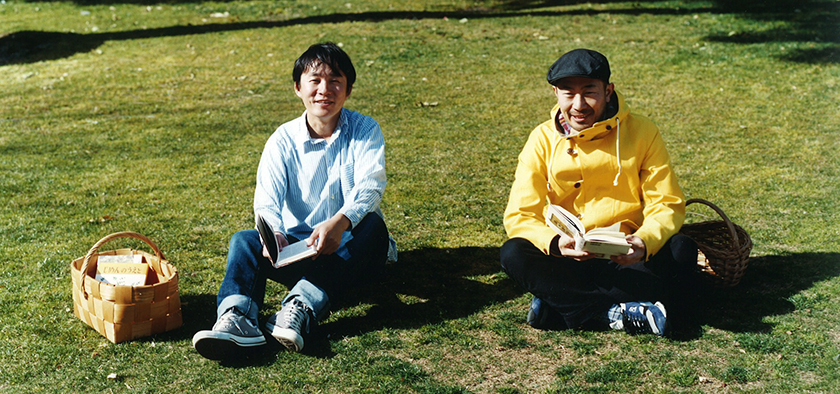
Favorite cities - Preferring Kanda to Utrecht?
EguchiI don't have a city I particularly like. Let me think..
HabaWhat? Isn't Utrecht your favorite city? If it's Amsterdam, you better change the name of your company and your store!
Eguchi (Pause) I'm thinking. You go ahead first.
HabaIt's not my favorite city but Norwich in England interests me now and is a city I would like to visit. At the literary festival, I talked with people from Norwich and heard that the city accepts writers who have been deprived of their nationality. There is public support and community support to give these writers an opportunity to write. Norwich itself is a tiny city with a small population of some 140,000 people, but during the literary festival, it gets visitors totaling about ten times the size of its population. The festival is an event which the whole town is engaged in. In the pubs, people start reading aloud at about four o'clock in the afternoon - the residents take their own initiative to do that kind of thing.
EguchiThat's interesting - the fact that people do it spontaneously.
HabaI suppose that during the period of the literary festival, people feel like they are participating in a village fair. Some people may not usually read that much, but they are motivated to do something connected to books because of all the excitement over books. I heard that the men at the pubs make an effort to read one book for the festival and take part in the book reading sessions.
EguchiWhen there is an opportunity, people do read, don't they? It would be nice if that kind of event could be held in Roppongi.
HabaYes. We could hold the reading sessions in the bars and cabarets.
EguchiSpeaking of places in England, Hay-on-Wye is also a famous town for revitalizing itself through books. A man called Richard Booth who calls himself the "king of books" opened a secondhand bookstore there. That led to many other secondhand bookstores being opened and the town became known for secondhand books. Richard Booth was adept at doing performances too; he declared the town an independent kingdom and created fun. Apparently Hay-on-Wye now constantly draws sightseeing visitors; part of its appeal probably lies in the books, which are items people feel close to.
HabaJimbocho in Japan is an wonderful town of secondhand books. It would be a pity not to take advantage of that town.
EguchiIn terms of the actual amount and quality of books, Jimbocho is probably the world's top town of secondhand books. There's a hall in Jimbocho where an auction is held every day; it's exclusively for bookstores which are members of the secondhand bookstore association. There's a different theme each day, and the secondhand bookstores pick books based on the theme and put them up for auction, and the other stores make bids. This kind of trading between professionals is another reality of Jimbocho. My bookstore is also a member of the association. There are longstanding rules and tones and etiquettes and we fail to buy...
HabaYou fail to make successful bids...
EguchiOh, I think I should say now that Jimbocho is my favorite town. Then I might make a good impression on the people of the secondhand bookstore association and I might be able to make successful bids!
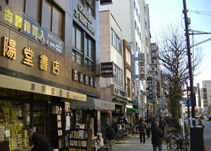
Jimbocho
The world's largest town for books. Book-related events such as the Furuhon Matsuri (Secondhand Book Fair) and the Jimbocho Book Festival are held every year. The town used to have many movie theaters.
The things that make Roppongi interesting
EguchiIs there a place in Roppongi that you like?
HabaI like "Shonzui." The meat is tasty and the natural wines are sublime. I also like the underground tequila bar "AGAVE".
EguchiThose establishments are rather special and of the kind you would find only in Roppongi. My favorite place would probably be the street that leads to X-Knowledge (the publisher) in Roppongi 7-chome. It's right near the Nogizaka station and yet it's in a weird street where you can't drive a car. As for restaurants, "Uoshin" is charmingly bizarre. It's located on the site of a former gasoline station, but the shop doesn't look like a shop that has been renovated from a gasoline station. It looks like a nest made at a gasoline station. It has a nice and strange appearance that is typically Roppongi.
HabaThe gasoline station opposite Tokyo Midtown is a place which I think is typically Roppongi. When you fill up the gas tank there, the staff cleans the wheels of your car for you. A car looks squeaky clean when its wheels are clean. The service is of a high quality that one would expect from Roppongi and it's quite impressive.
EguchiAnd there are the luxury condominiums at the back of the American Embassy. These luxury condominiums are not only gorgeous; they look as if they are located in the wrong place. There are even exclusive elevators for each home.
HabaThere's the U.S. army base in the Seijoki Dori; that place is not Japan. That is American land and helicopters are constantly landing there. If you think about it, it's considerably weird that such a place is so near.
EguchiBut the fact is that Seijoki Dori, and the American Embassy and the Defense Agency are what helped to shape Roppongi; I think they are blending in quite naturally.
HabaMaybe that's what makes "Shonzui" special. The food is tasty of course, but the seats are close to each other. It's like that in the cafes in Paris. The seats are close, so when you are having noisy fun, you become friends with the person sitting next to you. There's a pleasant sense of chaos and confusion in Roppongi. There are the rich people living on the top floors of Roppongi Hills and the hawkers at the Roppongi crossing luring customers; all kinds of people are tucked away in their various corners, as if they are being gradually woven into a kind of mesh that creates the town of Roppongi.
EguchiThat essentially is what makes Roppongi so interesting.
Editor's thoughts
Haba-san and Eguchi-san are good friends and the way they joked with each other during the interview left an impression on me. It was fine weather on the day of the interview, and I thought it would be lovely to read a book on the lawn on a day like this. I am looking forward to the Park Library event.(edit_rhino)




